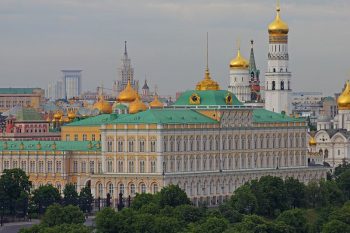
 September 12, 2009 • Analysis •
September 12, 2009 • Analysis •
Text of Jean-Sylvestre Mongrenier’s intervention at the 19th Economic Forum, Krynica (Poland), on 9-12 September 2009.
First and foremost, I would like to thank the Economic Forum of Krynica for inviting me. I am very honoured of it. I have to speak about Russia’s policy towards the European Union (EU) and I would want to make two preliminary remarks. First, the EU is more a Pan-European Commonwealth than a Commonwill. It is a Europe without a unified foreign policy and even a common overall picture, without a real common defence: NATO is always the main defence and security organization in Europe. So, the Russia’s foreign policy towards Europe cannot be envisaged as if NATO and the US did not exist. It would be artificial.
Second, the EU-Russian relations must be studied “in situation”, not in an abstract way. Let’s be careful with “generalizing generalities” as the “European Common House” – I think of Mikhail Gorbatchev and before him Yuri Andropov – or again “Europe from Atlantic to Ural”. So, it would be an error to elude or to scotomize the Georgian situation. Now, it is clear there has been no-return to the status quo on the ground and that is not an anecdotal fact or an exotic geopolitical theatre.
In consequence, the EU-Russia relations are both fragile and unstable; the renegotiation of the Brussels-Moscow partnership is a journey full of pitfalls, submitted to a stop-and-go process. I shall tackle this complex and global issue in three points. My first point will be about the Russian approach of the EU, made of contempt and hostility to it. My second point will deal with the “divide and rule” practiced by Moscow, opposite towards the Euro-Atlantic institutions, i.e. the EU and NATO. Then, in my third point, I shall approach the need to review our geopolitical approach, upstream from political decisions and strategic choices.
The Russian approach of the European Union
The Russian approach of the EU could be defined as a mix of contempt and hostility. On the one hand, most Russian leaders seem to hold in contempt the EU as such defined as a post-modern entity, dedicated to a kind of “Soft Power”. Now, the Russian leaders reason in terms of power politics and hard power, or in terms of manipulation and occult power; they are immunized against “soft ideology” by their “Tchekist” customs and mentalities. On the other hand, Moscow is fully aware of the presence of a powerful cooperative system – virtually, at least – on its western borders; a group of countries which extends from the Atlantic to the Baltic-Black Sea isthmus, includes about 500 millions of souls, with an economy as big as the American one. Moreover, most of the EU member States are also tied to the US through NATO.
Consequently, the Russian leaders are hostile to the EU and they do not want to see this “Commonwealth” turn into a global actor of international relations (“Europe-power”). Such a global actor would be a strategic competitor in the “near abroad”, much more attractive than the Kremlin project of a sort of post-Soviet Union through the Commonwealth of Independent States or the Collective Security Treaty Organization and various forms. In the nineties, Russian leader have “played” with the idea of a strong EU, yes indeed, and all the more after the Kosovo war but it aimed at challenging NATO and the US hegemony. Henceforth, Russia’s point of view is no more the same and the turning point was reached in 2004 with the enlargement of the EU, Eastwards, on the one hand, the Orange Revolution in Ukraine, on the other hand.
So, we can observe a Russian “divide and rule” strategy towards the EU and NATO. It will be my second point.
Divide and rule
The emerging Russia’s “grand strategy” has positive and negative goals. As it has been said before, the positive goal could be to reform a sort of post Soviet Union, led by Russia turned into a renewed great power. This ambition appears through various expressions as the “near abroad” or the “sphere of privileged interests” but “sphere of exclusive control” would be more exact. The negative goal is to prevent the enlargement and enhancement of the Euro-Atlantic ensemble, despite the will of free nations which are interested in them: neither real “Eastern Partnership” and “common neighbourhood”, nor “common energy policy”. The means of this “grand strategy” are energetic embargos, trade conflicts, political pressures, attempts of destabilisation, open threats and even military “coups de force”. These pressures are aimed at countries which belonged, twenty years ago, to the Soviet area and the Warsaw Pact.
At the same time, Moscow is trying to strengthen bilateral relations with Western Europe countries – as Germany, Italy, France – and some other ones. So, we can assert that Moscow practices a “divide and rule” strategy; it is a fact, not a mere point of view or just an opinion. The Russian leaders are not interested in a global cooperation – a global partnership – with the EU as a whole. They refuse to ratify the Energy Chart and respect its clauses and they do not want the EU to emerge as a global actor.
It is the same strategy and the same goals with NATO as it can be seen in the “Missile Defense” issue. It is well known that Russian leaders violently reacted to the project of deploying some antimissiles systems in Centre Europe. However, these systems – just a few ones – are not a threat to Russia’s strategic forces; Russia’s ballistic experts have asserted it and we should trust them. So, we have to wonder about the reasons that could explain Russia’s hostility towards this deployment. The Missile Defense is an opportunity to divide the Allies and “play” on the reluctance and the scepticism of several European governments; Russia’s aim would be to drive a wedge between “Old” and “New Europe” and also between Europe and the US.
This is just one sight and one aspect of this strategic issue and there are other more disquieting explanations. Russian leaders could consider that the American military involvement and the enlargement of NATO on the territories of former satellites countries are illegitimate; it implicitly claims a new “Brezhnev doctrine” – a Putin doctrine – in the former Warsaw Pact and not exclusively in the former USSR. But that would be the topic of another debate.
“Change your mind”
Consequently, it seems that Europeans and more generally Westerners have to change their minds about Russia’s foreign policy and then to elaborate geopolitical representations more in line with political and strategic situations. It will be my third and last point.
In the nineties and in the beginning of the 21st century, Russia was seen as a mere energy providing periphery, subject to the advice and liberalization policies of the EU, even as a part of the “European Common House”: Europe from Atlantic to Kamchatka! That rhetoric has already been practiced by Mikhail Gorbatchev and before him Yuri Andropov as it has been said. This “new Russia” seemed to be in “transition” towards the European pattern. Nowadays, it appears that there is a gap and discrepancy between that overall picture and the geopolitical realities, on the field. The paradigm of “transition” does not reflect the current evolutions and the Kremlin swings between the “Russian specificity” and the “Chinese way” rather than lean towards the European pattern.
Thus, it would be wrong to overlook the nature of the regime, its modes of operation and their external extensions. I do insist on this point: the rehabilitation of Stalin is not a detail. In the same way, the Russian-Georgian conflict and the revisionist Geopolitics of the Kremlin have to be taken into account and so do plans to reinforce power and coercion tools within Europe, including energy flows and monopolistic groups. All of that cannot be put aside and some “clichés” on the Russian soul and Slavic-Orthodox identity will not replace the lack of substantive analysis of the trends at work in Russia.
For me, the debate would be more about the capabilities and the sustainability of Russia’s “grand strategy”: Vladimir Putin and Dmitri Medvedev would like to be the champions of a Russia’s “emerging power” in a “multipolar world”, a new Russia able to convert the redistribution of flows into power, but the financial crisis and its consequences reveal the fragility of this “economy of pipes”. Currently, Russia appears as a “low power” in the grip of a serious demographic and health crash. In fact, Russia has not escaped the effects of the “Dutch disease” and it is well known that demography is the hour-hand of History.
So, in the long term, Russia’s power must not be overrated, yes indeed, but political and military events could be produced in the short term and History is not synonymous with logic; it is full of errors, miscalculations, and misunderstandings. We have to take into account the geopolitical representations of the Russia’s leadership even if they are perceived as irrational or unrealistic. Moreover, the cohesion and the strength of westerner societies in this “tardy modernity” must not be overrated. In fact, challenges have to be met “hic et nunc”, i.e. right now, and prospective thought should not be considered as an art of avoidance.
To conclude
I shall insist on the limits of a pseudo “Realpolitik” which would be the mask of a kind of short-sighted cynicism or even a sort of nihilism. The economic interests of a few nations cannot balance the security interests of their European partners and allies; a “special partnership” with a state outside of the EU and NATO – a Eurasian state which addresses threats to partners and allies – would endanger the cohesion and the strength of the Euro-Atlantic institutions. Now, the EU and NATO are what the economists name “public goods”, much more important, in the long term, than “special interests” and new channels for trade.
The Europe as one and whole does exist through the Euro-Atlantic institutions and preferential relations between their member states; a unified Europe is not a historical necessity and we have to take care of it. No-one could imagine what it would happen if the EU and NATO collapsed because of nation’s self-help.
In fact, we have to bear in mind the following question: in the end, what do we want? Do we want countries of “in-between” (as Ukraine or Georgia) resigned themselves to belong to a Russia’s sphere of control instead of turning away from authoritarism? Do we want to see new ideological rifts in Europe, just more Eastwards, instead of reaffirming our trust in the virtues of constitutional-pluralism, the rule of law and freedom? The answer is in the question. Thank you very much for your attention.
